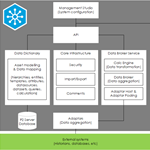
When getting data from IFS OI Server, depending on how you set the request interval, you can get IFS OI Server to return different numbers of results. These two different methods are known as Range Fetches and Single Point (or Spot) Fetches. This article explains the differences between them.
Read more

Entities are the backbone of all data in IFS OI Server, and represent real world objects about which we want to gather information and model. This article describes what entities are and how they are used.
Read more

IFS OI Server's key reason for existing is to get your data from any source and show its relationships, all with impressive speed, in a way that applications can easily consume it. This article describes the components of IFS OI Server and how they fit together.
Read more

Chances are that if you're reading this, you have some idea of what a dashboard is. You may even have designed a few, but what you really want to do is design a GREAT dashboard, one that gets people talking - for the right reasons! A dashboard is a single page…
Read more

The PI Adaptor provides IFS OI Server with standardised access to OSIsoft PI historian servers, hiding the complexity of obtaining data from PI and facilitating visualisation of PI data via consuming applications such as IFS OI Explorer. This article describes the features of the PI Adaptor.
Read more